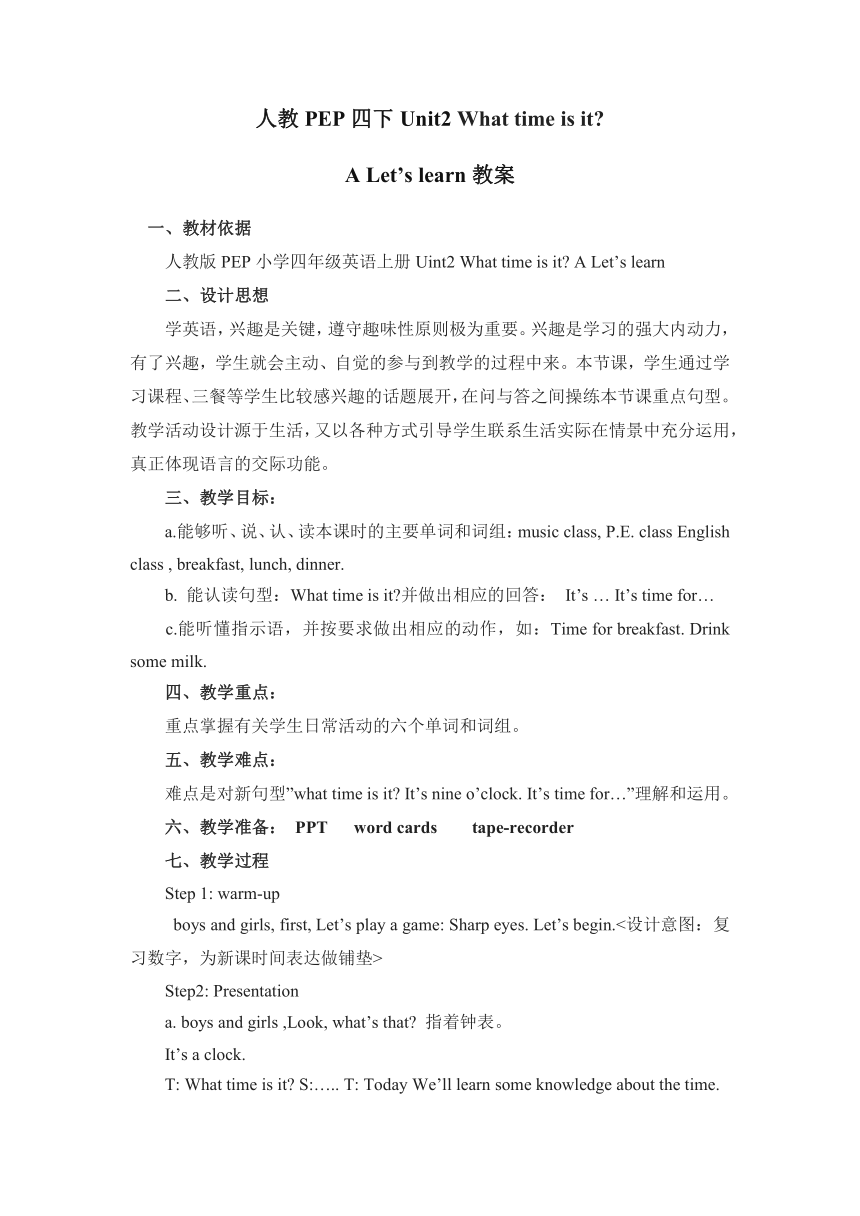Unit2 What time is it?A Let’s learn教案( 含反思)
文档属性
| 名称 | Unit2 What time is it?A Let’s learn教案( 含反思) |  | |
| 格式 | zip | ||
| 文件大小 | 17.7KB | ||
| 资源类型 | 教案 | ||
| 版本资源 | 人教版(PEP) | ||
| 科目 | 英语 | ||
| 更新时间 | 2022-01-04 20:03:38 | ||
图片预览

文档简介
人教PEP四下Unit2 What time is it
A Let’s learn教案
一、教材依据
人教版PEP小学四年级英语上册Uint2 What time is it A Let’s learn
二、设计思想
学英语,兴趣是关键,遵守趣味性原则极为重要。兴趣是学习的强大内动力,有了兴趣,学生就会主动、自觉的参与到教学的过程中来。本节课,学生通过学习课程、三餐等学生比较感兴趣的话题展开,在问与答之间操练本节课重点句型。教学活动设计源于生活,又以各种方式引导学生联系生活实际在情景中充分运用,真正体现语言的交际功能。
三、教学目标:
a.能够听、说、认、读本课时的主要单词和词组:music class, P.E. class English class , breakfast, lunch, dinner.
b. 能认读句型:What time is it 并做出相应的回答: It’s … It’s time for…
c.能听懂指示语,并按要求做出相应的动作,如:Time for breakfast. Drink some milk.
四、教学重点:
重点掌握有关学生日常活动的六个单词和词组。
五、教学难点:
难点是对新句型”what time is it It’s nine o’clock. It’s time for…”理解和运用。
六、教学准备: PPT word cards tape-recorder
七、教学过程
Step 1: warm-up
boys and girls, first, Let’s play a game: Sharp eyes. Let’s begin.<设计意图:复习数字,为新课时间表达做铺垫>
Step2: Presentation
a. boys and girls ,Look, what’s that 指着钟表。
It’s a clock.
T: What time is it S:….. T: Today We’ll learn some knowledge about the time.
齐读课题 What time is it
<设计意图:利用实物教具,形象、直观的引出时间句型>
b. look , I have a clock too. What time is it 用手拨弄指针。
T: Yes ,It’s nine o’clock. 板书 用手拨弄指针,进行多次练习,利用句型:what time is it It’s…
Choose a student to practice the sentences。起示范作用。
One ask one answer .then exchange. practise in pairs.
c. Check your work 找几组起来练习,看看掌握情况。
d. Look ,what time is it now 出示钟表时间。PPT展示。
S: It’s seven o’clock..
T: It’s time for breakfast. 板书 breakfast 领读
Look ,what time is it now S: It’s twelve clock.
T: It’s time for lunch. 板书 lunch领读
T: Look ,what time is it now S: It’s six clock.
T: It’s time for dinner. 板书 dinner 领读
<设计意图:利用每天吃饭的点,引出三餐的单词,贴近生活〉
f. Boys and girls, Do you like English Do you like English class We are having English class now. English class板书并领读
T: Boys and girls, Do you like sing and dance OK, Let’s go to the music class. music class. 板书并领读
T: Boys and girls,Do you like P.E. Do you like play football, jump and run ,Let’s go to the P.E. class. P.E. 强调大写,并且还有两个点。
<设计意图:利用生动活泼的动作,引出English class ,music class,P.E. class
学生在边学边做边玩中,掌握单词,学习兴趣浓厚。>
Step 3 : Consolidation
a. listen to the tape and repeat. (twice)
b. read the words as quickly as you can . I point you read .
c. let’s chant .for example : breakfast breakfast breakfast It’s time for breakfast. …
Step 4:Homework
Write the words
Write the new words, then make sentences
Write the words, make a dialogue.(choose one)
板书:
Unit 2 What time is it A Let’s learn
What time is it
It’s…o’clock. It’s time for…. English class/ breakfast/music class/ lunch/P.E. class /dinner.
八、教学反思
小学英语教学是要重视培养兴趣,但不能单靠说说唱唱玩玩等简单的活动练习。因为培养兴趣主要是为学习英语,游戏活动应成为小学生学习英语语言知识的手段。因此,我们激发学生对英语的学习兴趣过程,不能只停留在课堂表面的“活”,“乐”,“玩”中。“不学习语言规则,不掌握相当的词汇,英语的应用能力就是空中楼阁”,有的同学想积极参与活动却无能为力:说明活动要能应用语言知识首先要学会掌握知识,所以活动要在掌握基础知识基础之上进行效果更好。而语言本身具有的魅力,才是学生持久学习的驱动力,才是用之不尽,取之不绝的能源。因此活动、游戏作为帮助学生学好英语的一种有效教学形式,要真正发挥其辅助教学的功能,达到寓教于乐的真正目的。
在活动教学过程中,不可回避的如何对待优中差生。我设计活动要注重面向全体学生,难度适中,让大家都参与。我根据个人素质,性格特点,记忆力,反应速度等,在心中把每个班分成三组,因材施教,分层要求,以求最有效的激励机制促学生不断上进。 在激发他们的主动参与亲身实践中,培养他们的独立思考和合作探究的创新精神,实践能力,无形中调动学生的言语资料库。在实践中他们学会自我评价,由此产生的成就感又转化为无穷尽的学习后继力。
A Let’s learn教案
一、教材依据
人教版PEP小学四年级英语上册Uint2 What time is it A Let’s learn
二、设计思想
学英语,兴趣是关键,遵守趣味性原则极为重要。兴趣是学习的强大内动力,有了兴趣,学生就会主动、自觉的参与到教学的过程中来。本节课,学生通过学习课程、三餐等学生比较感兴趣的话题展开,在问与答之间操练本节课重点句型。教学活动设计源于生活,又以各种方式引导学生联系生活实际在情景中充分运用,真正体现语言的交际功能。
三、教学目标:
a.能够听、说、认、读本课时的主要单词和词组:music class, P.E. class English class , breakfast, lunch, dinner.
b. 能认读句型:What time is it 并做出相应的回答: It’s … It’s time for…
c.能听懂指示语,并按要求做出相应的动作,如:Time for breakfast. Drink some milk.
四、教学重点:
重点掌握有关学生日常活动的六个单词和词组。
五、教学难点:
难点是对新句型”what time is it It’s nine o’clock. It’s time for…”理解和运用。
六、教学准备: PPT word cards tape-recorder
七、教学过程
Step 1: warm-up
boys and girls, first, Let’s play a game: Sharp eyes. Let’s begin.<设计意图:复习数字,为新课时间表达做铺垫>
Step2: Presentation
a. boys and girls ,Look, what’s that 指着钟表。
It’s a clock.
T: What time is it S:….. T: Today We’ll learn some knowledge about the time.
齐读课题 What time is it
<设计意图:利用实物教具,形象、直观的引出时间句型>
b. look , I have a clock too. What time is it 用手拨弄指针。
T: Yes ,It’s nine o’clock. 板书 用手拨弄指针,进行多次练习,利用句型:what time is it It’s…
Choose a student to practice the sentences。起示范作用。
One ask one answer .then exchange. practise in pairs.
c. Check your work 找几组起来练习,看看掌握情况。
d. Look ,what time is it now 出示钟表时间。PPT展示。
S: It’s seven o’clock..
T: It’s time for breakfast. 板书 breakfast 领读
Look ,what time is it now S: It’s twelve clock.
T: It’s time for lunch. 板书 lunch领读
T: Look ,what time is it now S: It’s six clock.
T: It’s time for dinner. 板书 dinner 领读
<设计意图:利用每天吃饭的点,引出三餐的单词,贴近生活〉
f. Boys and girls, Do you like English Do you like English class We are having English class now. English class板书并领读
T: Boys and girls, Do you like sing and dance OK, Let’s go to the music class. music class. 板书并领读
T: Boys and girls,Do you like P.E. Do you like play football, jump and run ,Let’s go to the P.E. class. P.E. 强调大写,并且还有两个点。
<设计意图:利用生动活泼的动作,引出English class ,music class,P.E. class
学生在边学边做边玩中,掌握单词,学习兴趣浓厚。>
Step 3 : Consolidation
a. listen to the tape and repeat. (twice)
b. read the words as quickly as you can . I point you read .
c. let’s chant .for example : breakfast breakfast breakfast It’s time for breakfast. …
Step 4:Homework
Write the words
Write the new words, then make sentences
Write the words, make a dialogue.(choose one)
板书:
Unit 2 What time is it A Let’s learn
What time is it
It’s…o’clock. It’s time for…. English class/ breakfast/music class/ lunch/P.E. class /dinner.
八、教学反思
小学英语教学是要重视培养兴趣,但不能单靠说说唱唱玩玩等简单的活动练习。因为培养兴趣主要是为学习英语,游戏活动应成为小学生学习英语语言知识的手段。因此,我们激发学生对英语的学习兴趣过程,不能只停留在课堂表面的“活”,“乐”,“玩”中。“不学习语言规则,不掌握相当的词汇,英语的应用能力就是空中楼阁”,有的同学想积极参与活动却无能为力:说明活动要能应用语言知识首先要学会掌握知识,所以活动要在掌握基础知识基础之上进行效果更好。而语言本身具有的魅力,才是学生持久学习的驱动力,才是用之不尽,取之不绝的能源。因此活动、游戏作为帮助学生学好英语的一种有效教学形式,要真正发挥其辅助教学的功能,达到寓教于乐的真正目的。
在活动教学过程中,不可回避的如何对待优中差生。我设计活动要注重面向全体学生,难度适中,让大家都参与。我根据个人素质,性格特点,记忆力,反应速度等,在心中把每个班分成三组,因材施教,分层要求,以求最有效的激励机制促学生不断上进。 在激发他们的主动参与亲身实践中,培养他们的独立思考和合作探究的创新精神,实践能力,无形中调动学生的言语资料库。在实践中他们学会自我评价,由此产生的成就感又转化为无穷尽的学习后继力。
